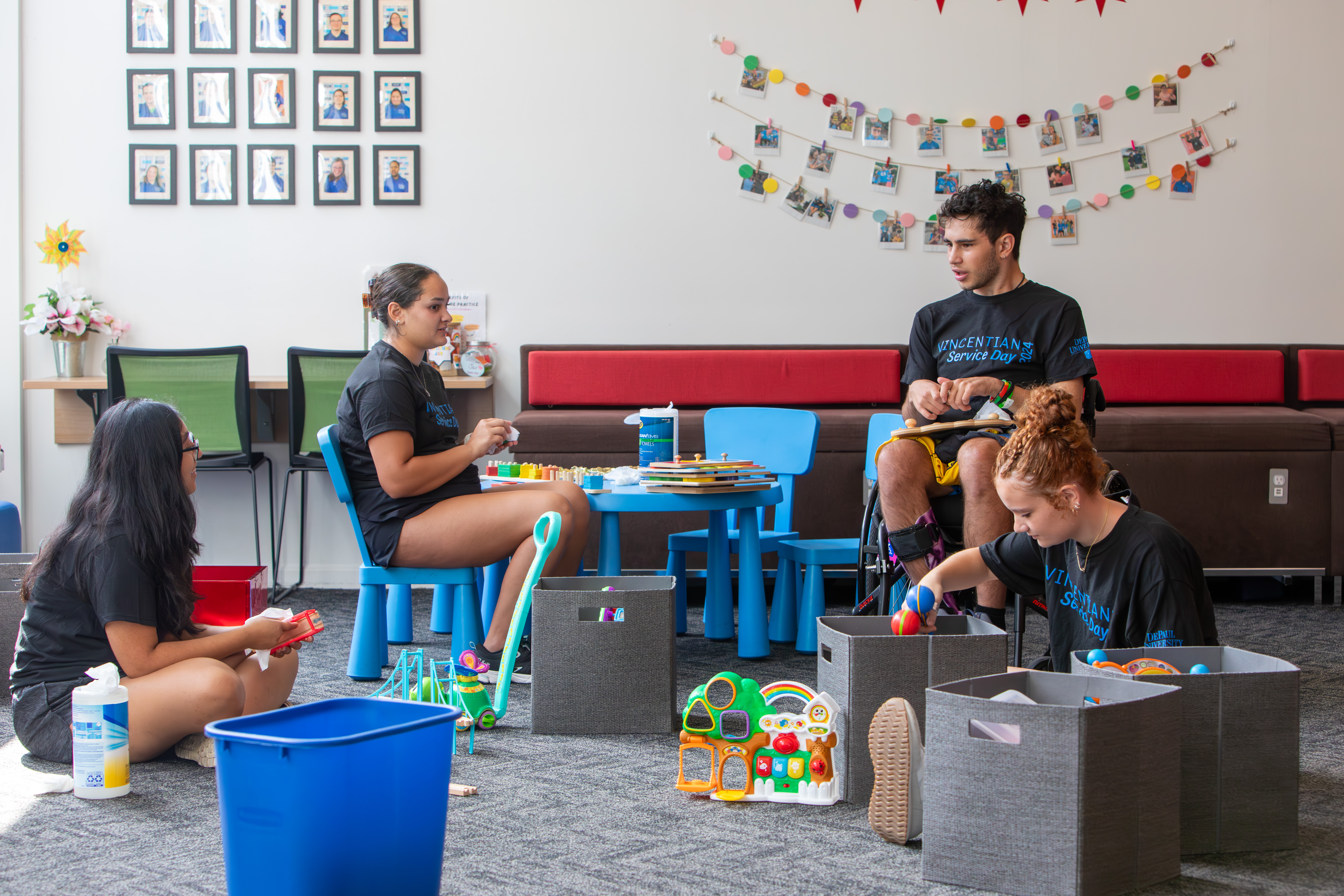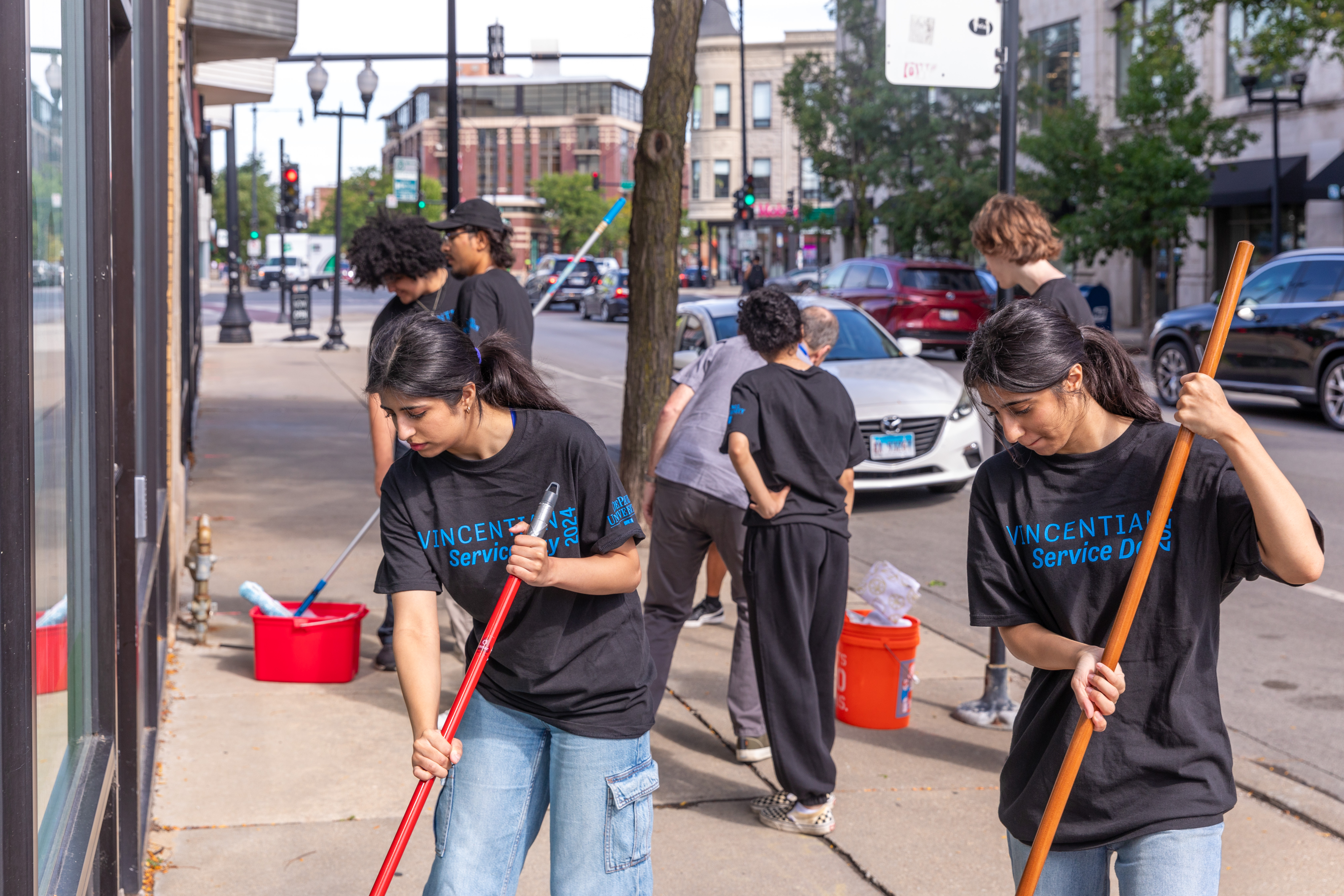 Students in the Disability in Chicago course spent an afternoon of service at Gigi's Playhouse Chicago during immersion week. (Photo by Keeton Holder/DePaul University)
Students in the Disability in Chicago course spent an afternoon of service at Gigi's Playhouse Chicago during immersion week. (Photo by Keeton Holder/DePaul University)
First-year students at DePaul can choose Chicago Quarter courses with focus areas exploring Chicago’s music scene, historic cemeteries and local businesses. This year the Disability in Chicago course brought students to iconic locations while deepening their understanding of accessibility and inclusion.
“No matter what program they're in at DePaul or explore after they graduate, these students will be able to take a piece of disability awareness with them and ensure that a focus on accessibility is represented in whatever they do,” says assistant professor of occupational therapy Molly Bathje, who leads the course.
Discovering Chicago spaces
Like all Chicago Quarter courses, this one immerses students in the city. With excursions to the Lincoln Park Zoo, Design Museum of Chicago and a field office for the Chicago Mayor, Bathje is familiarizing students with public transportation and DePaul’s campus.
At each site, in the classroom and even on the train platform, she explores the disability rights movement, frameworks for ensuring accessible and inclusive spaces and disability culture.
“In this class, I talk about service and the relationship of service to the Vincentian mission and to the identity of being a DePaul student,” Bathje says. “Regarding disability, I use the asset-based community development approach to ensure that students understand that we're serving not for people but with people.”
Bathje teaches in DePaul’s growing Occupational Therapy graduate program in addition to working with first-year students and has firsthand experience working to address health disparities in Chicago.
 In addition to learning in the classroom, Chicago Quarter courses bring students out into the Chicago community. (Photo by Keeton Holder, DePaul University
In addition to learning in the classroom, Chicago Quarter courses bring students out into the Chicago community. (Photo by Keeton Holder, DePaul UniversitySubjects discussed throughout the quarter include the history of disability rights, social determinants of health and being a good ally. Students volunteered at Gigi’s Playhouse Chicago, a local organization that provides free programs to individuals of all ages with Down Syndrome, and saw first-hand how disability services enrich their own community in Lincoln Park.
Learning in action
First-year student Melina Knickelbein connects what she’s learned in the course to her major in education.
“I thought it would be a good idea to know about accessibility in Chicago since I’ll likely work with kids with disabilities at some point in my career,” Knickelbein says. “Even though I'm not planning to work in special education, people with disabilities are in all kinds of classrooms. I need to know to deal with the barriers they may face appropriately.”
Bathje focuses on health disparities faced by adults with disabilities and recognizes the unique perspective DePaul can provide students through its Vincentian background.
“The ways that people want to help are sometimes not useful and can be traumatizing for people with disabilities,” Bathje says. “My goal is to encourage students to be mindful of this going forward.”
Zooming out with a wide lens is also one of Bathje’s priorities. Since this course is not limited to students from specific majors, she works to help students apply what they’re learning about disability to their chosen academic journey, as well as their life on campus.
“The topic is really meaningful because we’re really connecting with the idea of inclusion,” Knickelbein says. “I think that connects to our school because DePaul is all about inclusion and equity. If you're someone who's interested in knowing about how to be inclusive with anyone, this is a good class to highlight how to do that.”
Accessibility beyond the classroom
Aryiana Firmacion, a first-year psychology student taking the course, began to notice accessibility issues in her daily life after learning about these barriers in class.
“My class partner and I are working on a research paper, and we have to visit somewhere in Chicago to review its accessibility practices,” Firmacion says. “At the cafe we’re looking at, there isn't a way for a person who uses a wheelchair to enter because there are stairs but no ramp or elevator options. The goal is working on creating accessibility for everybody throughout Chicago.”
You can read more about DePaul’s Chicago Quarter program here.